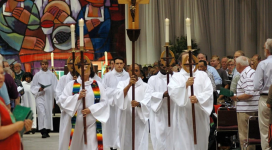A family index released Wednesday shows that more than half of American youth are growing up in families torn apart by divorce, separation and single parenthood.
As Christmas, a family-oriented holiday, draws closer, a study by the Marriage and Religion Research Institute reveals that 55 percent of America teenagers are living in non-traditional family structures marred by divorce, separation or unmarried parents.
By comparison, 45 percent of young adults live in intact families where the biological parents are married to one another since before or around the time of their child's birth.
The "Index of Belonging and Rejection" also reports that African-American and Native American teens are more likely than teens of other races and ethnicities to come up in a broken family.
Fewer than one in four American Indian and Alaskan Native adolescents (24 percent) have lived with married biological parents throughout childhood. African-American teens are least likely to live in an intact family. Fewer than one in five (17 percent) live with married parents.
At 62 percent, Asian-American teens are most likely to live with wedded, biological parents. Caucasian teens follow close behind at 54 percent.
Lead researcher Pat Fagan said the data displays a change in Americans’ concept of family structure.
"American society is dysfunctional, characterized by a faulty understanding of the male-female relationship," reflected Fagan.
The institute’s data is similar to that of the November Time-Pew Forum poll surveying Americans’ thoughts and behaviors related to marriage and family.
The three-part poll’s analysis of U.S. Census Bureau data showed that traditional experiences of marriage and family are changing to favor co-habitation and un-wedded families.
More than half of single respondents reported that they lived with, and in some cases are still living with, a partner. Among unmarried parents cohabitating with their partners, 62 percent believed marriage was obsolete.
Fagan attributed some of the disparity to environmental factors. Young adults who grow up in the South tend to have intact families, he noted. Teens that grow up in urban settings where the population is less educated and affluent tend to have lower proportions of two-parent families.
The Time-Pew poll similarly found that college-educated Americans are less likely to reject the idea of marriage.
"Our culture needs a compass correction, learning again how to belong to each other when we have begotten children together,” he summed.
If the number of traditional families continues to falter, Fagan cautioned that society as a whole will suffer. Resulting problems range from increased health and behavioral problems to decreased mental and behavioral health.
He contended that children in broken homes are more likely to live in poverty and become welfare-dependent. Those children also tend to struggle with academic achievement and social development. The future products of broken families, Fagan said, are increases in the high school dropout rate, teen pregnancies, crimes, victimizations, substance abuse, domestic abuse, child neglect, and broken families.
"Our future as a country depends on the strength of our families. Such strength is waning, which should give every American pause for concern and motivation for action," he concluded.
The Marriage and Religion Research Institute is a project of the Family Research Council.







